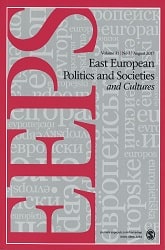Institutionalization and De-institutionalization in Post-communist Party Systems
Institutionalization and De-institutionalization in Post-communist Party Systems
Author(s): Zsolt Enyedi, Fernando Casal BértoaSubject(s): Political Philosophy, Government/Political systems, Post-Communist Transformation
Published by: SAGE Publications Ltd
Keywords: party system institutionalization; closure; fragmentation; volatility; Eastern Europe; Western Europe;
Summary/Abstract: In an article written in 1995 titled “What Is Different about Postcommunist Party Systems?” Peter Mair applied the method that he called “ex adverso extrapolation.” He matched his knowledge of the process of consolidation of party systems in the West with what was known at that time about Eastern European history, society, and the emerging post-communist party politics. Considering factors such as the existence of fluid social structures, the weakness of civil society, or the destabilizing impact of the so-called triple transition, his article predicted long-term instability for the region. In the present article, we evaluate the validity of Mair’s predictions, thereby also contributing to a lively debate in the current literature about the scale and nature of East–West differences and about the trajectories of the two regions. Going beyond the identification of cross-regional similarities and differences, we also differentiate between individual party systems, establish subgroups, and describe changes across time. Using four major dimensions (i.e., party system closure, party-level stability, electoral volatility, and fragmentation), the article finds that Mair’s predictions were largely, though not in every detail, right. Ironically, however, we also find that changes in the West tend to match over time the trajectory of the East.
Journal: East European Politics and Societies
- Issue Year: 32/2018
- Issue No: 03
- Page Range: 422-450
- Page Count: 29
- Language: English
- Content File-PDF

